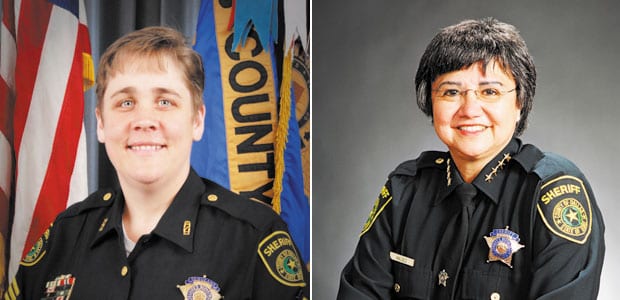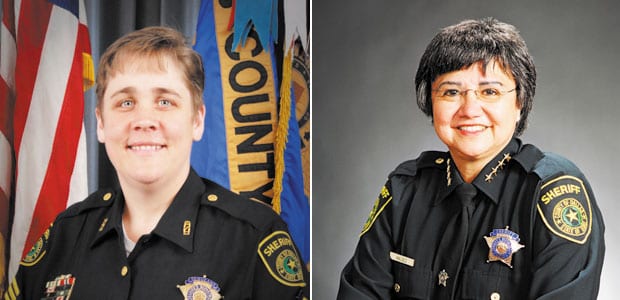Dallas County’s sheriff and the DCSO LGBT liaison officer don’t let their lesbian identity affect their jobs as law officers
Mat Shaw | Contributing Writer
nash@dallasvoice.com
Dallas County sheriff Lupe Valdez is the only out Latina lesbian sheriff in the United States. Still, she said, she should be judged by how good she is at her job, and she has the same standards for her employees.
“Who cares who you are and what color you are?” Valdez said. “I’m sure I have quite a few [LGBT employees], but I don’t ask them. I hope we get to a point where we never have to distinguish ourselves like that anymore.”
And she’s confident in her abilities as county sheriff. “I’m darn good at law enforcement because I’ve done it for 37 years,” she said.
Valdez is currently in her third term as Dallas County sheriff. She was elected to the position in 2004, and re-elected in 2008 and 2012.
She said it was a combination of life experiences that made her who she is today — being born to poor migrant workers in San Antonio and being surrounded by little education, as well as being a lesbian. All those things help her to empathize with other demographics, she said.
“I think, from the very beginning, it has helped me to be more conscious of what people go through in different categories,” Valdez said. “And honestly, because of that, I think it makes me a better head of the department, because I am aware of some of the issues [others] have to deal with.”
Valdez’s career in law enforcement began when she took a job as a jailer after serving active duty in the Army, even though at the time she had no interest in it.
“In any situation that you’re in, do the best you can and keep moving up,” she said. “If you’re a janitor, be the best janitor you can be. I can’t remember who said that.”
After retiring as a federal agent, Valdez ran for office in 2004 and was elected sheriff.
“When I first started, this department was such a mess,” she said. “Every week we were criticized about something.
I think we’re in such a fast world of fast service, that we expect someone to come in and in 24 hours everything should be straightened out.”
It didn’t happen overnight but since she took office 12 years ago, Valdez said, everything in her office has changed.
“My staff right now is 50 percent non-white,” she said. “Fifty percent of my department is run by women.”
The 50 percent women statistics includes Shelley Knight, captain over judicial services and LGBT liaison for the
Dallas County Sheriff’s Department, another out lesbian on the force.
Knight, who started out as a detention office, will mark her 25th anniversary with DCSO in August. But before she joined the department, Knight said she worked several part-time jobs after being discharged from the Marines on trumped-up charges of homosexual acts.
“My first sergeant that brought me up on charges and told me his job in the Marine Corps is to get rid of as many women Marines as possible,” Knight said. “[Homosexual acts] was the easiest thing to get someone out, and who was going to doubt it? My word against his.”
In early 1989, Knight said, there was a “witch hunt” in the Marine Corps. “Several Marines were either discharged or sent to the brig for being gay. The brig is jail. It’s military jail,” she said.
Knight said she had to take extra polygraph questions when she applied for her first position with the sheriff’s department because back then, DCSO didn’t hire gay people. Then came Mica England. England sued the state of Texas, the city of Dallas and the then-Dallas police chief when the Dallas Police Department refused to hire her because she was a lesbian.
When she won her case, anti-lesbian hiring policies were overturned at DPD, and DCSO decided to follow suit.
Knight said she stayed closeted for about two years after she was hired at DCSO because of her experiences with the Marine Corp. “I was paranoid and scared,” she said. “Then after a while I met so many people that already assumed it, anyway, and it was not a spoken thing.”
But people officially knew when Knight and her current partner became a couple, about 16 years ago. Her partner was the sergeant and worked in traffic, Knight explained.
“When Julie and I got together, everybody knew,” Knight said. “We didn’t invite one without the other being there.
Even when I got pregnant, I went and told my lieutenant, and his reaction was, ‘You’re joking, right? This is a practical joke.’ I was like, ‘No.’ And he was like, ‘Okay.’”
Knight’s son will be 14 in July, and she and Julie have a 25-year-old daughter and a 6-year-old granddaughter. Still, they don’t plan to get married. “We’ve been this happy couple for 16 years,” Knight said. “A piece of paper doesn’t make a difference.”
Knight and her family like to spend their free time camping, hiking, scuba diving and traveling, she said. But Sheriff Valdez, on the other hand, doesn’t get a lot of free time.
When she does find free time though, the sheriff said she devotes it to her partner.
“I have almost 2,500 employees, seven days a week, 24 hours a day,” Valdez said. “There’s a demand, there’s a question, there’s something every single moment. So if I do have any free time, she’s going to get it, and most of the time she decides what we’re going to do with it.”
Valdez has been with her partner, a chiropractor, for three years this September. More than likely, they’ll get married, she said, if they can survive remodeling the house. “Everybody says that the breakup comes during remodeling, building the house, finances,” she said.
Even though she knew she was different as a child, Valdez said, she didn’t come out until she was in her thirties. “I always thought that my affection for women was just, ‘Oh, I want to make best friends with them. I want to be their buddy,’” she said. “Until I saw an example, I was able to identify what it was, and that was quite late in life, and then I wouldn’t accept that because of my spiritual beliefs.
“I had to make sure it was okay with God before I accepted that, and once I was comfortable that it was okay with God, then it was easier to come out,” the sheriff said.
Knight said she had a good idea she was gay after being discharged from the Marine Corps in March 1990, almost a year after graduating from high school. But she knew she was different in the first grade.
“I just didn’t feel the same way the other girls did,” Knight said. “I seriously started thinking about it when I was a [high school] freshman. I never acted on it until after the Marine Corps.”
The reason she didn’t act on it was because of religion, her family and nervousness over what people would think, she said. But Knight’s experiences with the department have been positive.
“I’ve proven myself professionally and I’m respected,” she explained, adding that Dallas is an extremely tolerant city.
“I don’t feel the need to look over my shoulder and see if people are watching, whereas other places I have felt that need,” Knight said.
When she took the title of LGBT liaison in 2008, she was given activities to do and places to go. Now those activities have dwindled down, she said. “That could be due to the increase in responsibilities,” she said. “When I took on the added responsibility, I was a sergeant.”
One thing Knight’s been working on in the department is creating a new comprehensive and acceptable transgender policy, she said. “We’ve been working with the Trans Pride Initiative to make sure it meets the needs that we have,” she said. “It’s been an ongoing project.”
But Knight said she would also like to go out and meet other people as part of her assignments. “Just events,” she said. “Just going and meeting groups, knowing the dates and times and answering questions that they might have with the department. I have not heard of any complaints.”
Valdez, however, expects to see both praise and criticism coming her way.
“I think some people consider me courageous for taking the steps that I took, but there are also people that hate my guts,” she said. “When you’re set as an example by one group, you’ll always have the counter-group that will use you as their punching bag.”
But Valdez still sees herself as an elected official for all people.
“Shortly after I got elected, I went to thank all the hundreds of groups that supported me,” she said. “I went to the Hispanic group and they said, ‘We elected you.’ I went to the African-American group and they said, ‘We elected you.’ I went to the LGBT group and they said, ‘We elected you.’ It takes all of them.
“Yes, I want to help all those groups. I don’t get up and say, ‘I’m a specialty person. I only deal with one group.’”
This article appeared in the Dallas Voice print edition June 17, 2016.


